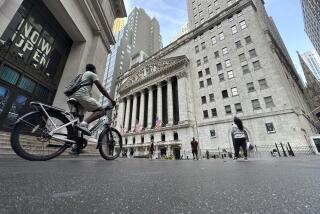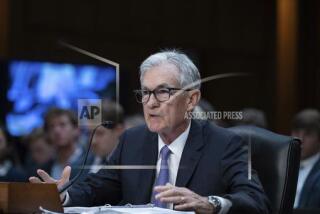House votes 327-98 to require audit of Federal Reserve
WASHINGTON — Hoisting a once-fringe issue into the political mainstream, the House overwhelmingly approved a long-fought proposal by Rep. Ron Paul (R-Texas) to require an audit of the Federal Reserve.
Not only tea party stalwarts but also rank-and-file Republicans and dozens of Democrats voted for the measure Wednesday — a reflection of the rising influence of the former presidential contender’s brand of libertarianism on American politics as he prepares to leave Congress.
Rep. Jim Matheson, a Utah Democrat who is in a tough reelection battle, said in a tweet that he would vote for the bill. “Greater transparency in gov’t is always a good thing,” he wrote.
The nation’s central bank is already the subject of various audits, but the legislation would remove limits on reviewing certain of the Fed’s operations, including its transactions with foreign central banks and its open-market operations.
Approval by the House probably will be the bill’s last act for now because the Senate is not expected to consider it, despite a push Wednesday from the congressman’s son, Sen. Rand Paul (R-Ky.).
But the robust bipartisan vote, 327-98, reflects lawmakers’ unease with the fallout from the Great Recession, and the lingering sentiment among voters that Main Street endured greater financial losses than Wall Street during the economic downturn.
Massachusetts Rep. Barney Frank, the top Democrat on the Financial Services Committee, warned that passage would destabilize the economy. And Rep. Steny H. Hoyer of Maryland, the Democratic whip, said the legislation would politicize the bank’s independence.
“Congressional review of the Fed’s monetary policy decisions would be a nightmarish scenario, especially judging by the track record of this Congress when it comes to governing effectively,” said Hoyer, invoking a warning from Federal Reserve Chairman Ben S. Bernanke.
“This bill increases the likelihood that the Fed will make decisions based on political rather than economic considerations, and that is not a recipe for sound monetary policy.”
Paul has long blamed rising inflation on the power of the nation’s central bank, which was established by Congress in 1913 to stabilize the financial system and contain risk. His first bill to audit the Fed was introduced in 1981, and his 2009 book “End the Fed” is a well-known politico manifesto.
This was the first time Paul’s bill had come to the House floor for a vote, though an earlier version had been approved in the 2010 Wall Street reform bill, only to be stripped out on final passage.
“I don’t know how anybody could be against transparency and they want secrecy, especially when that secrecy is to protect individuals who deal in trillions of dollars — and these trillions of dollars bail out all the wealthy, rich people, the banks and the big corporations,” Paul railed in a speech Tuesday.
Professor Richard Sylla, an economic historian at New York University’s Stern School of Business, said Paul’s efforts may go “too far” in attempting to micromanage the institution.
“Ron Paul is part of a long tradition of challenging the central bank’s right to exist,” Sylla said. “I’m suggesting there is more to the Paul bill than just Congress’ legitimate need to know what the Fed is doing.”
More to Read
Inside the business of entertainment
The Wide Shot brings you news, analysis and insights on everything from streaming wars to production — and what it all means for the future.
You may occasionally receive promotional content from the Los Angeles Times.











